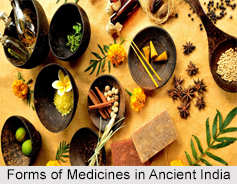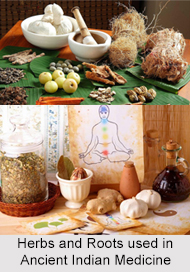 In the ancient text "Charaka Samhita", various forms of medicines have been described by Charaka. According to Charaka, the different forms of medicines are as follows:
In the ancient text "Charaka Samhita", various forms of medicines have been described by Charaka. According to Charaka, the different forms of medicines are as follows:
Churna or powders are prepared by pounding dry substances in a mortar with a pestle and passing the powder through cloth.
Svarasa or expressed juice is prepared by pounding fresh vegetables in a mortar, expressing the juice and straining it through cloth.
Kalka or paste is prepared by grinding dry or fresh vegetable substances on a stone with a muller, and then making a thin paste, with the addition of water when necessary.
Kvatha or decoctions are prepared by boiling 1 part of vegetable substances with 16 parts of water till the latter is reduced to one-fourth. The medicines should first be pounded small and then boiled over a slow fire. The decoction is then strained through cloth. When decoctions are prepared with dry substances, 8 parts of water are recommended to be used. Decoctions are administered with the addition of salt, honey, sugar, treacle, alkalies, ghee, oil or some medicinal powders.
Phanta or infusions are prepared by steeping 1 part of powdered herbs in 8 parts of hot water, for 12 hours during the night. They are administered in the same way as decoctions.
Sitakashaya or cold infusion is prepared by steeping 1 part of a drug in 6 of water for the night and straining the fluid in the morning.
Paniya is a weak form of decoction prepared by boiling 1 part of medicinal substances in 32 of water till the latter is reduced to one-half. This preparation is usually taken ad libitum for appeasing thirst or some such object.
Pramathya is a sort of decoction in which the medicines are first reduced to a pulp and then boiled in 8 parts of water till the latter is reduced to one-fourth. It is administered with the addition of honey.
Mantha is an emulsion of medicines in fine powder with four parts of cold water.
Kshirapaka is a decoction in milk. The proportions in this preparation are 1 part of medicine, 8 of milk and 32 of water. The materials are boiled together, till the water is evaporated and the milk alone remains. The decoction is then strained.
Yavagu is a preparation where medicines are added to powdered rice, wheat, barley, etc. and boiled with water into a gruel which is taken as aliment. The proportion of water in this preparation is 6 to 1 of solid materials. This preparation is called "Kvatha-Sadhya-Yavagu" or gruel made with a decoction of medicines.
Avaleha are extracts. To prepare it, decoctions, after being strained, are again boiled down to the consistence of a thick extract. This extract, when properly made, does not readily dissolve in water. Extracts are administered with the addition of sugar, decoctions or powders.
Vatika and Gudika are pills and boluses respectively. These are usually prepared by reducing a decoction of vegetable substances to a thick consistence and then adding some powders for making a pill-mass. Sometimes pill-masses are made of powdered medicines with the addition of treacle or honey.
Modaka are boluses prepared by adding powders to cold syrup and stirring them together till uniformly mixed. No boiling is required in this preparation.
Kkandapaka are confections made by adding to syrup medicines in fine powder and stirring them over the fire till intimately mixed and reduced to proper consistence. Honey is often subsequently added to confections.
Bhavana are maceration of powders in fluids. Powders, and especially mineral substances, are often soaked in various fluids, such as expressed juice of herbs, decoctions, etc. and then dried. A single operation of this sort is completed in 24 hours, but the process is generally repeated from 3 to 7 times.
Putapaka is roasting. In this process vegetable drugs are reduced to a paste which is wrapped up in jamvu or vatapatra (leaves of Eugenia Jambolona and Ficus Bengalensis), firmly tied, covered with a layer of clay and roasted in cow-dung fire. When the layer of clay assumes a brick-red colour on the surface, the roasting is known to be completed. The ball should now be withdrawn from the fire and broken, and the juice of the roasted drug expressed and administered, with the addition of honey or such other adjuncts as may be directed. Sometimes the roasted drug itself is given in the form of a powder or pill.
Sandhanavarga are products of acetous fermentation.
Kanjika is a sour liquid produced from the acetous fermentation of powdered paddy. It is cooling, refrigerant, and useful as a drink in fever, burning of the body, etc. It is sometimes applied externally upon the principle of wet-sheet packing, cloth steeped in the fluid being wrapped around the body for relief of high fever and heat of body. It is also used as a vehicle for other medicines and for preparing decoctions, oils etc.
Arnala is a sour gruel made from fermentation of boiled rice. The properties of this preparation is regarded as cooling, refrigerant, diuretic, and useful in nervous diseases, rheumatism, dyspepsia, indigestion, urinary diseases, intoxication from spirituous drinks, etc.
Dravaka are distilled mineral acids. A number of mineral substances or salts are heated in a retort and the distilled fluid collected in a glass receiver.
Asava and arishta are medicated spirituous liquors. These are prepared from honey and treacle, with the addition of various medicinal substances. They are all steeped in water and laid aside in earthen jars for vinous fermentation. When raw vegetables are used for fermentation, the resulting fluid is called "Asava". When the decoction of drugs only is added, the fermented liquor is called "Arishta".
Ghritas are Medicated oils. These are decoctions of vegetable drugs in oil or Ghrita (clarified butter) and form a prominent feature of native practice. They are prepared in great varieties and are extensively used in almost all sorts of diseases. The ghritas are chiefly used internally, and the oils are rubbed on the body.
Related Articles
Traditional Indian Medicines
Charaka Samhita
Ayurveda
History of Ayurveda
Origin of Ayurveda
Ayurveda Medication
Principles Of Ayurveda
Elements of Ayurveda
Concepts of Ayurveda
Ancient Literature of Ayurveda





